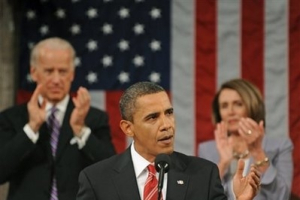President Obama spent half of his more than one-hour speech addressing the economy and job creation. But social conservative critics zeroed in on his pledge to repeal the military’s “don’t ask, don’t tell” policy and his push to pass health care reform that may include abortion coverage.
In his first State of the Union address, Obama set out a plan on how to boost the economy and help hurting middle-class Americans. The president’s proposal included using the $30 billion repaid by Wall Street banks to provide loans to small business owners, creating jobs by investing in infrastructure and clean energy, and slashing tax breaks to companies that ship jobs overseas to keep jobs in America.
He also called for greater bank regulations to “guard against the same recklessness that nearly brought down our entire economy” and to provide more funding for education reform.
“The best anti-poverty program around is a world-class education,” Obama said.
He proposed making college more affordable by giving families a $10,000 tax credit for four years of college and increasing Pell Grants. After college students graduate, Obama suggested a law that requires them to only pay 10 percent of their income to student loans and the debt to be forgiven after 20 years. If the student goes into public service, then the debt would be forgiven after 10 years.
“[B]ecause in the United States of America, no one should go broke because they chose to go to college,” the president said.
But social conservatives were up in arms when the speech shifted to health care reform and the “don’t ask and don’t tell” policy.
During the speech, Obama emphasized how close the country is to passing health care reform and the millions of Americans that would benefit from it.
“And by now it should be fairly obvious that I didn't take on health care because it was good politics,” Obama said, drawing laughter. “I took on health care because of the stories I've heard from Americans with preexisting conditions whose lives depend on getting coverage; patients who've been denied coverage; families – even those with insurance – who are just one illness away from financial ruin."
“Here's what I ask Congress, though: Don't walk away from reform. Not now. Not when we are so close. Let us find a way to come together and finish the job for the American people,” he pleaded.
But Focus on the Family took issue with Obama on his health care speech for not acknowledging the value of life.
“He basically looked at the American public tonight and said, ‘I don’t care what you think about health care, we are still moving forward,” said Ashley Horn, federal issues analysts for Focus on the Family Action. “He didn’t say anything about the value of life, he didn’t say anything about marriage. That’s what we really would love to see out of a president.”
Using stronger words, the conservative public policy group Family Research Council said it will continue to “work to ensure taxpayers are not forced to be part of the president’s pro-abortion agenda.”
Conservatives also opposed Obama’s plan to repeal the “don’t ask, don’t tell” policy that bars gays and lesbians from serving openly in the military.
“The military is a warrior culture for a reason: Our service members wear the uniform to fight and win wars, not serve as liberal social policy guinea pigs,” said FRC president Tony Perkins, a veteran of the Marine Corps. “The sexual environment the President is seeking to impose upon the young men and women who serve this country is the antithesis of the successful war fighting culture and as such should be rejected.”
Sen. John McCain (R-Ariz.) likewise opposed the idea of repealing the “don’t ask, don’t tell” policy, which he says the majority of the U.S. military supports.
“At a time when our Armed Forces are fighting and sacrificing on the battlefield, now is not the time to abandon the policy,” said McCain after the State of the Union address.
During Wednesday night’s address, President Obama also proposed a government spending freeze for three years starting in 2011. However, spending related to national security, Medicare, Medicaid, and Social Security would not be affected.
Other issues the president addressed included increasing investments to care for veterans, moving towards reducing nuclear weapons in the world, passing an equal pay law so women are paid the same salary as men, and fixing the immigration system.
“I campaigned on the promise of change – change we can believe in, the slogan went,” Obama said. “And right now, I know there are many Americans who aren't sure if they still believe we can change – or that I can deliver it.
“But remember this: I never suggested that change would be easy, or that I could do it alone.”
Obama said in a large democracy when you try to make big changes “it stirs passions and controversy.” But he urged Americans to not quit and continue to work to strengthen the country.

















